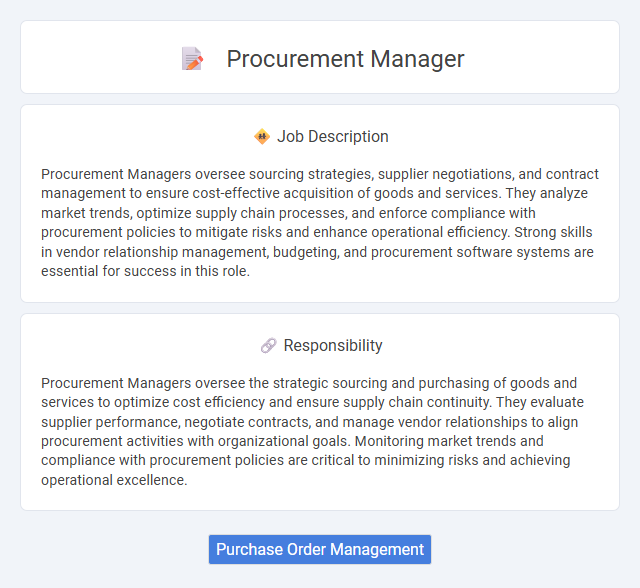
Procurement Managers oversee sourcing strategies, supplier negotiations, and contract management to ensure cost-effective acquisition of goods and services. They analyze market trends, optimize supply chain processes, and enforce compliance with procurement policies to mitigate risks and enhance operational efficiency. Strong skills in vendor relationship management, budgeting, and procurement software systems are essential for success in this role.
Individuals with strong organizational skills and an analytical mindset are likely to thrive as Procurement Managers, as the role often demands strategic decision-making and effective supplier negotiations. Candidates who excel under pressure and demonstrate exceptional communication abilities may find this position well-suited to their strengths. Conversely, those who struggle with multitasking or lack attention to detail might face challenges adapting to the dynamic nature of procurement responsibilities.
Qualification
Procurement Managers typically require a bachelor's degree in supply chain management, business administration, or a related field, often complemented by certifications such as Certified Professional in Supply Management (CPSM) or Chartered Institute of Procurement & Supply (CIPS). Strong analytical skills, proficiency in procurement software, and experience in vendor negotiation and contract management are essential qualifications. Knowledge of market trends, cost reduction strategies, and compliance with procurement regulations enhances a candidate's effectiveness in the role.
Responsibility
Procurement Managers oversee the strategic sourcing and purchasing of goods and services to optimize cost efficiency and ensure supply chain continuity. They evaluate supplier performance, negotiate contracts, and manage vendor relationships to align procurement activities with organizational goals. Monitoring market trends and compliance with procurement policies are critical to minimizing risks and achieving operational excellence.
Benefit
A Procurement Manager likely enhances company profitability by securing cost-effective suppliers and negotiating favorable contracts, which can reduce operational expenses significantly. This role probably improves supply chain efficiency, ensuring timely delivery of quality materials that support uninterrupted production processes. Benefits may also include fostering strong vendor relationships that contribute to long-term savings and competitive advantages for the organization.
Challenge
A Procurement Manager likely encounters the challenge of balancing cost reduction with maintaining quality and supplier reliability. Managing complex supply chains and negotiating contracts under pressure may require advanced strategic thinking and strong communication skills. Navigating market fluctuations and regulatory compliance also probably demands adaptability and proactive problem-solving.
Career Advancement
A Procurement Manager oversees the strategic sourcing and supplier relationship management crucial for cost efficiency and operational success. Mastery in negotiation, supply chain analytics, and contract management creates pathways for promotion to senior roles such as Head of Procurement or Supply Chain Director. Continuous skills development in digital procurement tools and sustainability practices significantly enhances career advancement opportunities within multinational corporations.
Key Terms
Purchase Order Management
Procurement Managers oversee the entire Purchase Order Management process, ensuring accurate creation, approval, and tracking of purchase orders to maintain inventory levels and control costs. They collaborate with suppliers and internal departments to verify order specifications, negotiate terms, and guarantee timely delivery. Efficient management of purchase orders enhances supply chain performance and supports organizational procurement goals.
 kuljobs.com
kuljobs.com